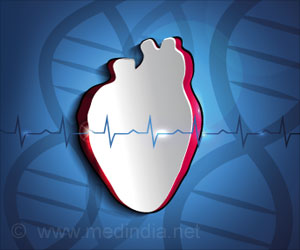Highlights:
- New genetic mutations have been found to be associated with congenital heart disease
- Some of these are inherited, while others arise de novo
- The information will help affected individuals and their families understand the risk of congenital heart disease in successive generations
Inherited mutations : The genetic mutations that were found to be inherited by the children from their parents included the following:
- Mutation in the FLT4 gene: This mutation was associated with 2.3% cases of a complex heart disease called Tetralogy of Fallot. Tetralogy of Fallot includes four heart defects namely, ventricular septal defect, pulmonary stenosis, right ventricular hypertrophy and an overriding aorta on the ventricular septal defect.
- Mutations in the MYH6 gene: The MYH6 gene encodes for a muscle protein called myosin. Mutations in the MYH6 genes have been associated with 11% cases of Shone syndrome. Shone syndrome consists of congenital defects affecting the left side of the heart which include supravalvular mitral membrane, parachute mitral valve, subaortic stenosis and coarctation of the aorta.
- Mutations in the GDF1 gene: Mutations in both the gene copies of the GDF1 gene were associated with around 5% cases of severe congenital heart disease in children of Ashkenazian descent.
The scientists also found that twelve genes that were previously not associated with congenital heart disease were found to have a more than 70% chances of association with the condition.
The new information will help individuals identify the possible risk congenital heart disease in a child. It will also help individuals to know the chances of a second child or later generations suffering from congenital heart disease. Since a large number of genes may be contributing to the congenital heart disease, the scientists suggest that whole genome sequencing would be a better option than looking out for a particular mutation.
About Congenital Heart Diseases
Congenital heart diseases are heart defects present since birth. They range from mild defects, which may go unnoticed until adulthood, or serious defects which may be fatal at birth if left untreated. Examples of congenital heart defects include atrial and ventricular septal defects, narrow or incompetent valves, or complex defects like Tetralogy of Fallot. The symptoms could include breathlessness, bluish discoloration and fatigue. Heart murmurs may be noted on examination. The affected children can suffer from long-term complications despite surgical treatment.Reference:
- Jin SC et al. Contribution of rare inherited and de novo variants in 2,871 congenital heart disease probands. Nature Genetics (2017) doi:10.1038/ng.3970
- What Are Congenital Heart Defects? - (https://www.nhlbi.nih.gov/health/health-topics/topics/chd)
- What Is Tetralogy of Fallot? - (https://www.nhlbi.nih.gov/health/health-topics/topics/tof)
Source-Medindia















